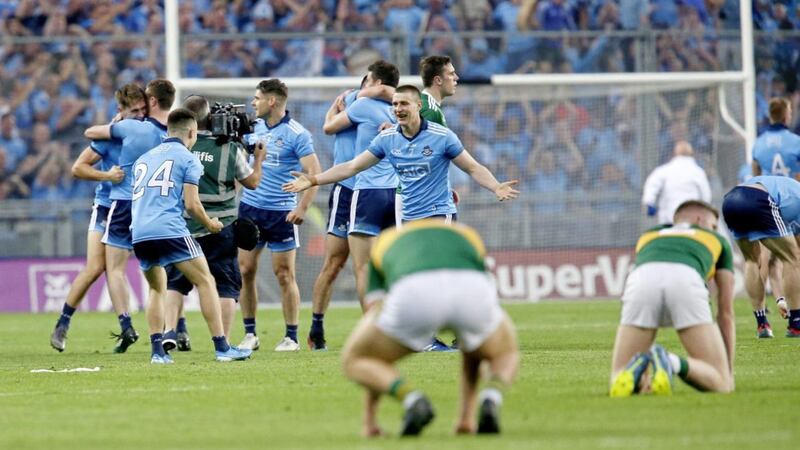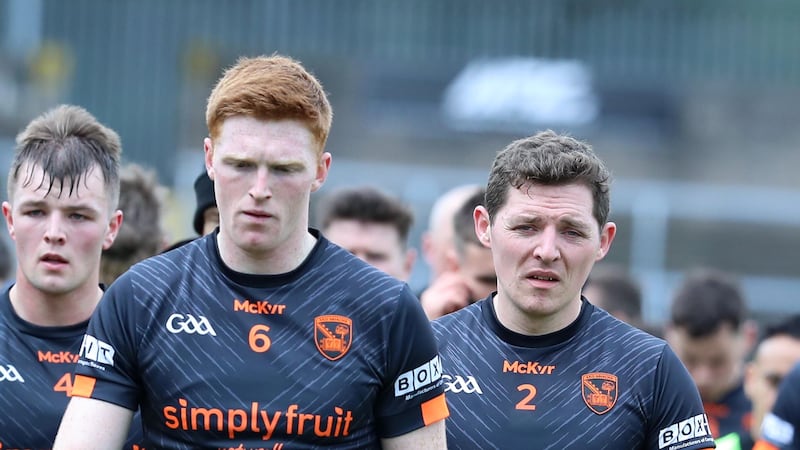THE problem with Dublin is not the money they’ve been given. It’s the money they’ve learned to make.
Excellence. Standards. Expertise. Brilliance. Knowledge. Power. Professionalism.
They have become what they do.
The GAA gave Dublin a leg-up by zoning in on them, and they’re still standing at the foot of the wall with the ladder up in the highly unlikely event that the fall comes.
The GAA taking games development funding away won’t make the firm bankrupt.
Dublin used the leg-up to put things in place that will sustain.
The distribution of that funding is rightly being scrutinised. Dublin barely need it, for they are the nearest thing to self-sustaining that any county will ever be.
We’re talking about a figure in the region of €1.4m per year. Even if that funding were cut in four to bring their figure per registered player roughly into line, Dublin county board has the financial capabilities to make up the shortfall itself.
Money would have to be moved, but not found.
This is money that funds the GPOs in clubs. It’s not directly related to the running of inter-county teams, barring to service them in the long-term with players.
The work over the last two decades has left the club circuit with far more secure foundations than it had previously.
Families have been indoctrinated through schools and clubs, and the numbers playing GAA have grown exponentially.
As Westmeath footballer John Connellan pointed out in his recent open letter, Cuala is paired with biotech giants Amagen. Last week, they announced a new partnership with Eddie Brennan, a man that 28 and possibly more inter-county teams in Ireland would love to have as their manager.
Many of the senior clubs in Dublin are massive entities. The GAA has taken greater root in some of the more middle-class areas of the city. Membership fees, as Connellan again pointed out, are potentially worth hundreds of thousands of euro each year.
Sport, by its nature, is imbalanced.
Val Andrews, speaking in this paper at the weekend about why he didn’t consider joining Tommy Lyons’ backroom team almost two decades ago, said: “That’s me being stupid too because life’s not about being fair. Life’s about how to deal with unfairness most of the time.”
It’s actually scary to consider the idea that what is broken can already not be fixed.
Where there is sport, there is money. And where there is money, there are poor and there are rich.
The richer the wealthy get, the harder it becomes to stop them accumulating more.
As we’d say, money goes to money.
Dublin have created such a strong position that the reduction, or even the removal, of their games development grant would not create an insurmountable obstacle.
Between the county board and the clubs themselves, many of whom are funding their own second GPO as it is, the capital has the capital to survive.
For that, they deserve commendation.
That doesn’t make it any less difficult to swallow. But let’s not lose sight of the fact the GAA has always been dominated by a very small number of counties.
Kerry and Dublin have 66 football All-Irelands between them. No other county is in double figures.
Kilkenny, Cork and Tipperary share 94 All-Ireland hurling titles.
Yet the difference in then and now was that it was cyclical. The Eddie Kehers and Christy Rings and Jack O’Sheas did retire and when they did, a gap opened up.
Dublin’s greatest threat to football is that they’ve stitched the seams of transition so tight, only the strongest have any chance of breathing through them.
Their average age has stayed pretty much the same over their entire five-in-a-row run. This is, by the way, their eighth final in ten years.
27.4 years was the average against Meath, and only Cluxton was over 31. They left Brian Howard, Paul Mannion, Cormac Costello, Philly McMahon, Cian O’Sullivan and Rory O’Carroll out of their team.
They carried on robotically pulverising Meath. They have replaced Bernard Brogan, Paul Flynn, Alan Brogan, Ger Brennan, Jack McCaffrey, Cian O’Sullivan, Diarmuid Connolly, et al, et al. And they’ve done it without losing grip.
So it is about stopping Dublin. It absolutely is. It has to be.
Because the standards they have set in terms of their professional approach on the pitch, and their commercial muscle off it, cannot be replicated by the smaller counties.
Rural Ireland has been left for dead by the government over a long period. Depopulation, be it foreign or domestic emigration, has practically been encouraged by the fact that there is nothing anywhere outside the major cities.
There is not the industry in the whole western half of Ireland to compete with a city that boasts Google, Apple, Facebook, LinkedIn, Twitter, Pfizer and the rest.
That people are willing to spend €1,000 a month to sleep beside the washing machine tells you the population surge is only going one way.
Dublin has advantages the GAA did not create and can do absolutely nothing about.
But both must recognise this as fact, rather than pretending it is fiction.
The Dubs themselves, such as Bernard Brogan with his “once-in-a-generation” tweet on Saturday night, can do better than to treat the population as imbeciles. There are times when it is better to say nothing, and this was one of them.
The problem with them is that they’ve done nothing wrong and are doing pretty much everything right.
They must accept the redistribution of funding, the pooling of sponsorship and the sharing of skills and expertise.
Because right now, it is no fun for 28 counties or more. And the gap is only widening. It will not shrink of its own accord.
The GAA saved Dublin.
It’s time now for Dublin to save the GAA.








